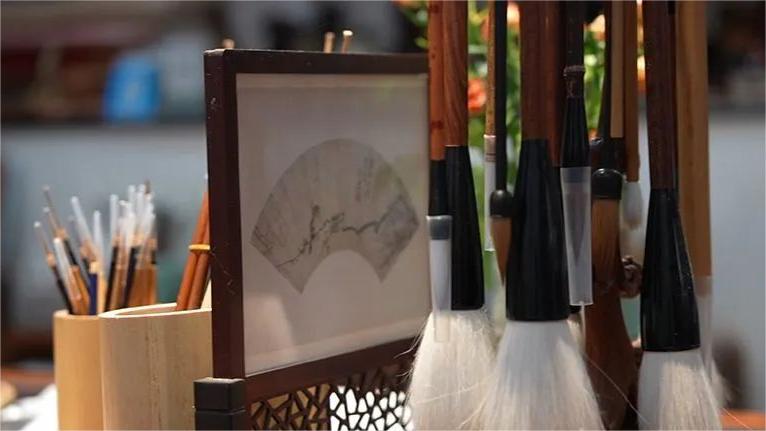"Forced labor" lies bring "forced unemployment" in Xinjiang
URUMQI, June 7 (Xinhua) -- What Aminam Tulladin wants above all else is her old job back.
Recalling her workdays just a few years ago, she described the moment she received her first pay check as "an elating moment."
Now, the 26-year-old from northwest China's Xinjiang Uygur Autonomous Region is a housewife struggling to make ends meet.
"I'm yearning to go back to work," she said.
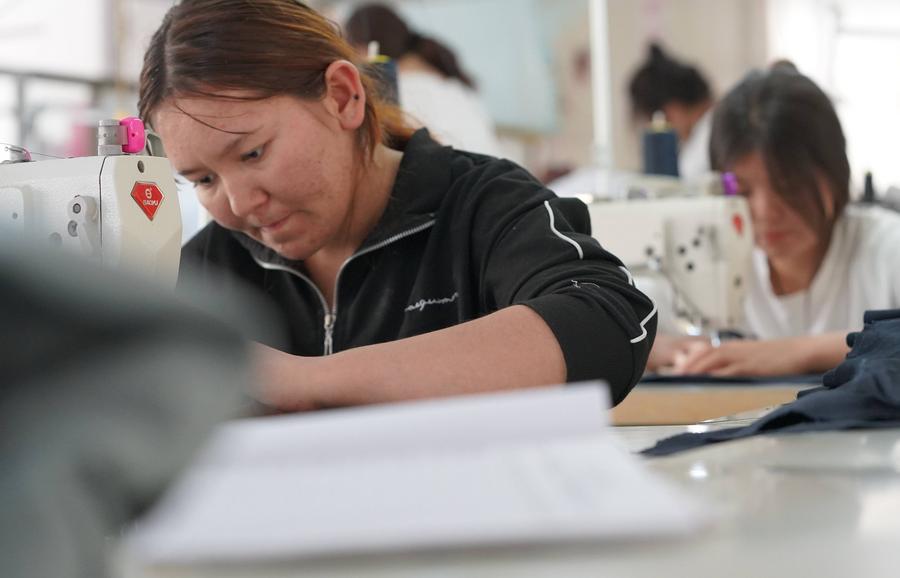
Employees work at a factory of the Shache Xiongying Textile Co., Ltd. in Shache, northwest China's Xinjiang Uygur Autonomous Region, June 2, 2024. (Xinhua/Su Chuanyi)
Starting in 2017 as an intern at a textile processing company in Qingdao, a coastal city in eastern China, Aminam Tulladin was more than thrilled to hear that her boss, Xu Caifeng, decided to move their company to her home county, Shache, in southern Xinjiang.
One year later, her hard work was rewarded with a promotion to team leader and a decent salary of over 3,000 yuan (about 421.9 U.S. dollars) a month.
Back then, the company, Shache Xiongying Textile Co., Ltd., employed nearly 1,000 staff with orders mainly coming from Europe and the United States, logging an annual sales revenue of 15 million yuan.
As their business continued to grow, Xu and her husband channeled more money into the company and built a second-phase workshop in the latter half of 2019.
The future seemed bright and promising. Never could they have imagined that their fates would take a sudden turn just because of some lies fabricated by someone a million miles away.
"FORCED LABOR" OR "FORCED LAYOFFS?"
Soon after the completion of the new workshop, Xu became concerned when their incoming orders gradually dwindled, and eventually, their European and U.S. business nearly came to a halt, rendering the new workshop "idle from the moment it was built."
It took them a while to finally discover the reason. "It turned out that our factory was mentioned in a report written by Adrian Zenz, who accused factories in Xinjiang of 'forced labor'," said Xu.
Under the guise of an academic study, Zenz concocted a series of "research reports" related to Xinjiang, wantonly discrediting the region.
In one report, he made the groundless claim that hundreds of thousands of ethnic minority workers in Xinjiang were "forced" to pick cotton by hand, urging the international community to issue temporary sanctions against any production containing cotton from Xinjiang.
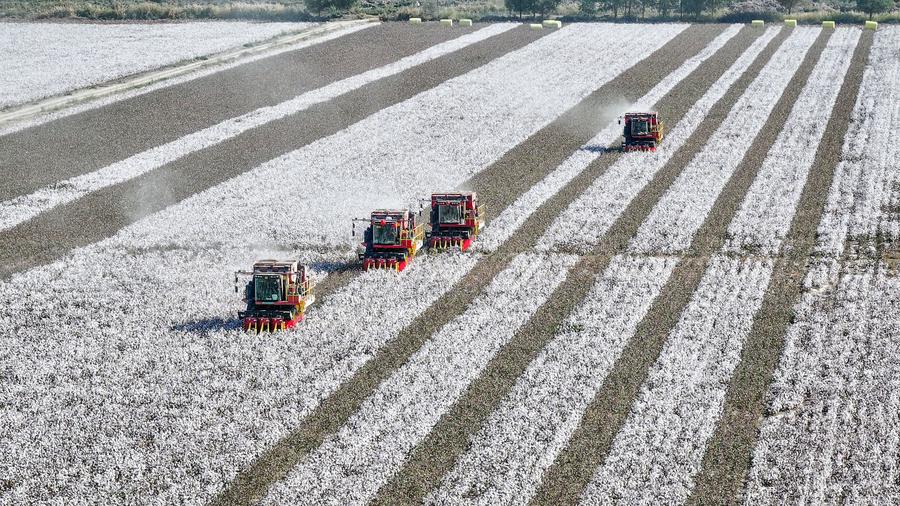
An aerial drone photo taken on Oct. 12, 2023 shows machines harvesting cotton in Korla, northwest China's Xinjiang Uygur Autonomous Region. (Xinhua/Li Xiang)
Back in 2018, with a view to expand into the European and U.S. markets, Xiongying applied for and obtained a BSCI (Business Social Compliance Initiative) human rights certification.
BSCI representatives stayed at Xiongying for a week, conducting an extensive review of the company's daily production and the lives of its employees. "None of them raised any concerns," Xu recalled.
Now the once bustling community with modernized workshops has almost turned into a ghost town. Only half of the machines on the second floor of the three-story factory remain operational, and fewer than 100 employees remain to fulfill the meager orders that trickle in.
Aminam Tulladin and many other ethnic minority employees had to quit their jobs due to the decrease in orders.
"We obtained this certification to secure more orders, but instead, what we got are production halts and sanctions..." Xu's voice trailed off as she fought back tears.
Xiongying is just a microcosm of numerous companies affected by the U.S. sanctions against Xinjiang.
More than half of the farmers in Xinjiang grow cotton to make a living, and the textile industry creates nearly one million job opportunities across the region. Shache, where ethnic minorities constitute over 95 percent of its population, used to have nearly 100 textile enterprises, but today fewer than one-fifth remain operational.
In recent years, Western media has kept hyping Xinjiang-related issues, fabricating "forced labor" in its cotton industry, and Washington signed the so-called "Uyghur Forced Labor Prevention Act" into law.
Ostensibly to safeguard "human rights" under the guise of combating "forced labor," the law has only caused "forced unemployment" that led to poverty in and outside Xinjiang.
Even outside the region, like in the central Chinese province of Hubei, about 1,000 natives of Xinjiang had to quit their jobs from the local non-woven fabric sector and move back home, though none of them had worked against their will.
In a recent interview, a Chinese manufacturer-exporter who had to lay off all his Xinjiang employees because of the act, quoted a stark ultimatum from his American clients: "As long as you have one single worker from Xinjiang, we cannot work with you."
"WHAT WILL OUR FUTURE BE LIKE?"
Also starting as an intern, Aminam Iminniyaz, 26, has worked at Xiongying for six years.
"The job is close to home and offers competitive wages, and has good benefits," she said.
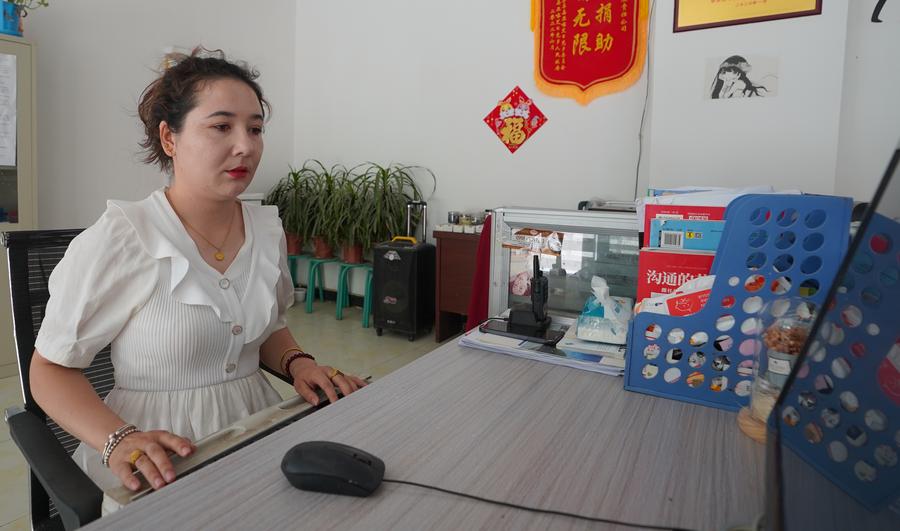
Aminam Iminniyaz works at the Shache Xiongying Textile Co., Ltd. in Shache, northwest China's Xinjiang Uygur Autonomous Region, June 2, 2024. (Xinhua/Su Chuanyi)
Though plummeting orders forced Xu and her husband to lay off the majority of their employees, the wages of those who stay have remained unchanged.
"What will our future be like if the company doesn't thrive? I fear that our current livelihoods could be at risk," said Aminam Iminniyaz. "Many people have lost their jobs. I feel very angry."
Also subject to sanctions is Hoshine Silicon Industry Co., Ltd., a world-leader in silicon manufacturing. In June 2021, Hoshine and four other solar energy companies in Xinjiang were included in the "entity list" by the United States and subjected to unjustified sanctions. The reason given was that these companies violated the human rights of ethnic minorities and engaged in the purported "forced labor."
Its subsidiary in Ganquanpu Economic Development Zone in the regional capital Urumqi has also been affected.
"It's a huge blow to us," said Cheng Yufeng, general manager of the subsidiary. "We lost almost all our customers in the United States and many customers in other regions such as Europe, racking up billions of yuan in losses."
In Hoshine's project in Turpan, nearly 10,000 ethnic minority employees make up 70 percent of its total workforce. The proportion is 50 percent and 20 percent in its factories in Shihezi and Urumqi, respectively. The fate of companies subject to unfair sanctions is closely intertwined with the lives and incomes of the local ethnic minority group.
"NO 'FORCED LABOR' AT ALL!"
In 2020, 10 natives of Moyu County in Hotan came to work at Saurer Xinjiang Intelligent Machinery Co., Ltd., in Urumqi. Munarwan Nur, now 28 years old, is one of them.
Recalling her initial days in Urumqi, Munarwan Nur said: "I wasn't used to it at first. I dared not talk too much as my Mandarin was not good."
But now, this cheerful, cosmopolitan young woman, effortlessly switches between her native Uygur language and Mandarin.
In July last year, Munarwan Nur and her husband purchased a home in Urumqi. They plan to bring their two children to the city for their schooling this summer.
"Now, I've got a clear goal in life, and I'm highly motivated," she said.
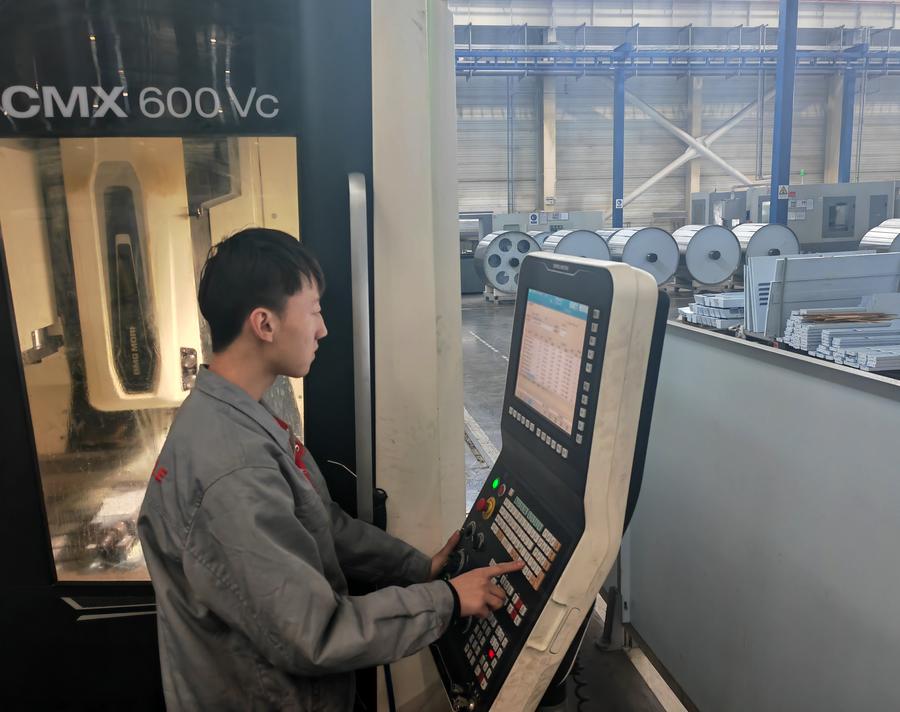
A technician works at Saurer Xinjiang Intelligent Machinery Co., Ltd. in Urumqi, northwest China's Xinjiang Uygur Autonomous Region, Feb. 27, 2024. (Xinhua/Pan Ying)
From Moyu to Urumqi, Munarwan Nur's journey is backed by the regional government's efforts from 2018 to 2020 to provide employment opportunities and facilitate poverty alleviation for those who are willing and capable to work in 22 deeply impoverished counties across the four prefecture-level regions in southern Xinjiang.
Through technical training and employment, these individuals were given the opportunity to improve their lives. Unfortunately, these efforts have also been unjustly labeled as "forced labor."
Zenz, the so-called German scholar, said in a report that poverty alleviation is an extremely intrusive combination of forced or at least involuntary training and labor, inter-generational separation and social control over family units.
"Our decision to stay or leave is completely voluntary," said Munarwan Nur. Out of the 10 employees who initially joined Saurer, seven have already left. Some have chosen to find jobs near their home to better take care of their families, while others went back to farming.
"Our contracts, benefits and salaries are exactly the same as our Han colleagues. We have weekends and holidays off, and get paid for extra working hours," said Abuduwali Abla, also from Moyu.
Abuduwali Abla, 39, a father of four, is responsible for sorting goods at the factory.
When asked about his income, he took out his phone and showed Xinhua his bank statements, which showed a deposit of 68,000 yuan for the year 2023. In comparison, the per capita disposable income of residents in Xinjiang that year was 28,947 yuan.
When asked if he felt compelled to stay at the company, Abuduwali Abla said: "I won't leave unless they asked me to. Where can you possibly find 'forced labor' like this?"
Photos
Related Stories
- Scenery of Lujiaowan scenic area in Xinjiang
- China's Altay sees booming tourism
- Artists from China's Xinjiang present performance in Türkiye's Istanbul
- Duku Highway in Xinjiang resumes traffic after annual winter closure
- Xinjiang enters peak tourism season with various rural tour routes, cultural events
Copyright © 2024 People's Daily Online. All Rights Reserved.








